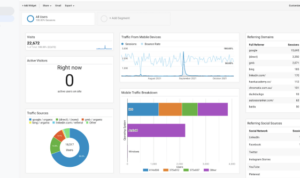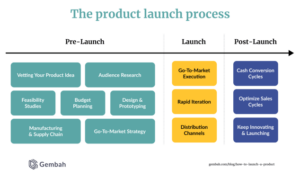Affiliate Marketing Guide: Embark on a journey to master the art of affiliate marketing, from understanding the basics to implementing advanced strategies for success.
Whether you’re a seasoned marketer or just starting out, this guide will provide you with the tools and knowledge needed to thrive in the world of affiliate marketing.
Affiliate Marketing Overview

Affiliate marketing is a performance-based marketing strategy where businesses pay affiliates for driving traffic or sales to their website through the affiliate’s marketing efforts. Affiliates earn a commission for each sale or lead generated through their unique affiliate link.
Successful Affiliate Marketing Programs
- Amazon Associates: Amazon’s affiliate program is one of the most popular and successful in the industry, allowing affiliates to earn commissions on products sold through their referral links.
- ShareASale: ShareASale is an affiliate marketing network that connects affiliates with merchants, offering a wide range of products and services to promote.
- CJ Affiliate: Formerly known as Commission Junction, CJ Affiliate is a trusted network with a large selection of affiliate programs to choose from.
Benefits of Affiliate Marketing
- Low Risk: Businesses only pay affiliates when a desired action is completed, such as a sale or lead, making it a cost-effective marketing strategy.
- Increased Reach: Affiliates can help businesses reach a wider audience by promoting products or services to their own followers and subscribers.
- Performance-Based: Affiliates are motivated to drive results as they earn commissions based on their performance, leading to higher sales and conversions.
Getting Started with Affiliate Marketing: Affiliate Marketing Guide
Affiliate marketing can be a lucrative way to earn money online by promoting products or services and earning a commission for each sale made through your unique affiliate link. Here are the steps to start an affiliate marketing program and some tips on finding the right products to promote.
Steps to Start an Affiliate Marketing Program
- Research and choose a niche that interests you and has a demand in the market.
- Sign up for an affiliate program or network that aligns with your chosen niche.
- Select products or services to promote that are relevant to your niche and target audience.
- Generate your unique affiliate links for the selected products or services.
- Create valuable content such as blog posts, reviews, or social media posts to promote the affiliate products.
- Drive traffic to your content through various marketing channels like , social media, email marketing, etc.
- Track your affiliate links’ performance and optimize your strategies for better conversions.
Finding the Right Affiliate Products to Promote
- Choose products or services that you have personally used and believe in to build credibility with your audience.
- Look for products with high commission rates and good conversion rates to maximize your earnings.
- Consider the target audience’s needs and preferences when selecting affiliate products to ensure relevance and interest.
- Research the competition and analyze the market trends to identify lucrative affiliate products in your niche.
Choosing the Right Affiliate Network
- Join reputable affiliate networks that offer a wide range of products, reliable tracking tools, and timely payments.
- Check the network’s terms and conditions, commission structures, and support services before signing up.
- Read reviews and testimonials from other affiliates to gauge the network’s reputation and performance.
- Consider the network’s reporting capabilities and analytics tools to track your performance and optimize your campaigns.
Strategies for Successful Affiliate Marketing

Affiliate marketing success relies on implementing effective strategies that resonate with your target audience and drive conversions. By utilizing various tactics such as review sites, social media promotion, and email marketing, you can maximize your affiliate marketing efforts and achieve your goals.
Review Sites, Affiliate Marketing Guide
Review sites are a powerful platform for affiliate marketing as they provide in-depth analysis and recommendations on products or services. By creating high-quality, honest reviews, you can build trust with your audience and influence their purchasing decisions. Make sure to focus on relevant products within your niche and provide valuable insights to your readers.
Social Media Promotion
Social media platforms offer a vast reach for promoting affiliate products to a diverse audience. By leveraging platforms like Instagram, Facebook, Twitter, and Pinterest, you can engage with your followers, share compelling content, and drive traffic to your affiliate links. Utilize visually appealing images, videos, and engaging captions to captivate your audience and encourage them to click through to the product pages.
Email Marketing
Email marketing remains a highly effective strategy for affiliate marketers to nurture relationships with their audience and promote affiliate products. By building an email list of subscribers interested in your niche, you can send targeted campaigns with personalized recommendations and exclusive offers. Craft compelling subject lines and valuable content to increase open rates and click-through rates, ultimately driving conversions and earning commissions.
Creating Compelling Content
Compelling content is the key to success in affiliate marketing. Whether you’re writing product reviews, creating social media posts, or crafting email campaigns, your content should be informative, engaging, and authentic. Focus on addressing the pain points of your audience, highlighting the benefits of the products you’re promoting, and providing valuable insights that help them make informed purchasing decisions.
Tracking and Analyzing Performance
Tracking and analyzing the performance of your affiliate marketing campaigns is essential to optimize your strategies and maximize your earnings. Utilize tracking tools and analytics platforms to monitor key metrics such as click-through rates, conversion rates, and revenue generated. By identifying trends, analyzing data, and making data-driven decisions, you can refine your approach, improve your results, and achieve long-term success in affiliate marketing.
Legal and Ethical Considerations in Affiliate Marketing
When engaging in affiliate marketing, it is crucial to understand the legal requirements and ethical considerations that come with promoting products and services for commissions.
Legal Requirements for Affiliate Marketers
- Affiliate marketers must disclose their affiliate relationships to their audience in a clear and transparent manner.
- It is important to comply with the Federal Trade Commission (FTC) guidelines regarding affiliate disclosures to avoid any legal repercussions.
- Affiliate marketers should also adhere to any specific laws and regulations related to affiliate marketing in their region or country.
Ethical Considerations in Affiliate Marketing
- Affiliate marketers should strive to promote honest and valuable products or services that align with their audience’s interests and needs.
- It is essential to maintain trust with your audience by providing genuine recommendations and not misleading them for personal gain.
- Avoid promoting products or services that you have not personally tried or do not believe in, as this can harm your credibility and reputation as an affiliate marketer.
Tips for Compliance in Affiliate Marketing
- Regularly review and update your affiliate disclosure statements to ensure they are clear, prominent, and easily accessible to your audience.
- Stay informed about any changes in FTC guidelines or regulations related to affiliate marketing to ensure ongoing compliance.
- Educate yourself on best practices for ethical affiliate marketing and seek guidance from reputable sources or affiliate marketing networks.





